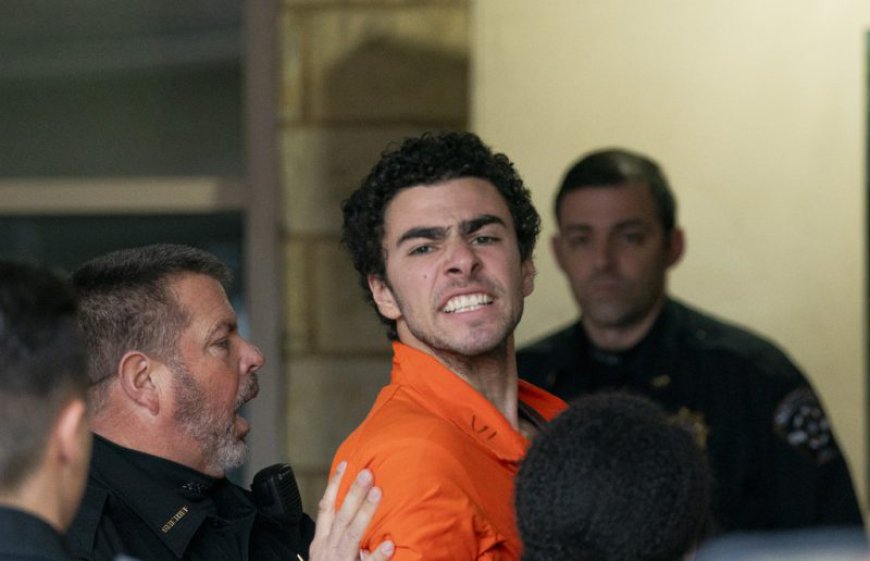UnitedHealthcare CEO murder suspect intends to plead not guilty: lawyer
Alleged UnitedHealthcare CEO shooter Luigi Mangione was arrested at a Pennsylvania McDonald's on Monday.

(NewsNation) — A judge denied bail for Luigi Mangione, the 26-year-old man accused of killing UnitedHealthcare CEO Brian Thompson, as he and his attorneys contested efforts to extradite him to New York from Pennsylvania.
Mangione is facing a murder charge in New York in connection with the shooting. Pennsylvania is seeking a governor's warrant to transfer him and has 30 days to obtain one.
Blair County District Attorney Peter Weeks said both Pennsylvania and New York's governors feel confident they can get the warrant before the deadline.
In the meantime, Mangione will remain in the State Correctional Institution Huntingdon.

As he was escorted into a Pennsylvania courthouse Tuesday afternoon, Mangione shouted to reporters gathered outside about injustice in the system.
"It's completely an injustice and an insult to the American people," he said.
Alleged UnitedHealthcare CEO shooter's lawyer speaks
Mangione's lawyer, Pennsylvania defense attorney Thomas Dickey, told NewsNation that he "hasn't seen any evidence that says [Mangione] is the shooter.”
“I don’t want people to jump to these prejudgment things because nobody would ever want that if they were accused, or one of their loved ones were accused,” Dickey said exclusively on “CUOMO” Tuesday.
In Pennsylvania, Mangione was charged Monday with forgery, carrying firearms without a license, having “instruments of a crime,” tampering with records or information and false identification to law enforcement.
"We have plead[ed] not guilty to those charges,” Dickey said, adding that he’s not aware of “any actual charges” in New York.
However an online court docket obtained by NewsNation shows that Manhattan prosecutors have filed a second-degree murder charge, among others, against Mangione.
Dickey said that, when he does see charges from New York, his “expectation” is for Mangione to plead not guilty, saying, “That certainly would be my advice.”
He also pointed to Pennsylvania law that classifies most crimes — except for capital punishment cases, which Mangione's is not — as bailable offenses.
“I believe that bail should’ve been set,” he said, explaining that while bail could’ve been an unrealistic number in the millions, it still should’ve been set.
Dickey refused to discuss Mangione’s state of mind, their conversation or previous extradition protests, telling reporters that he and his client will “take one step at a time.”
“I think we’ve made a strong bond, and I’m looking forward to, moving forward, helping him out,” Dickey said.
Dickey, who took on the case Tuesday, refused to clarify who hired him.
UnitedHealthcare CEO shooting
Thompson was killed while walking to the company’s annual investor meeting. Police say they believe the attack was targeted and not a random act of violence.
The words “deny,” “depose” and “defend” were written on the shell casings found at the scene of the shooting, police sources said to NewsNation local affiliate WPIX.

The words appear to be a possible reference to a book titled “Delay, Deny, Defend,” which details the ways insurance companies use to reject requests for medical coverage deemed necessary by doctors.
UnitedHealthcare has the highest claim denial rate among insurance companies, rejecting 32% of submitted claims compared to the industry average of 16%.
Thompson, 50, was a father of two. He became CEO of UnitedHealthcare in 2021 and helped the company bring in $281 billion in profits in 2023. Between salary and other benefits, he was estimated to have more than $10 million in compensation last year.
Earlier this year, Thompson was sued by the Hollywood Firefighters’ Pension Fund for insider trading and fraud. Executives at United Healthcare were being investigated by the Department of Justice over allegedly running a monopoly and unfairly blocking out competitors.
The Department of Justice also launched an antitrust investigation into the UnitedHealthcare Group following a cyberattack on a subsidiary that handled health care payments. During the attack, many patients were forced to pay out of pocket for care and medications or were unable to get them because medical facilities were unable to process payments.
What's Your Reaction?

























